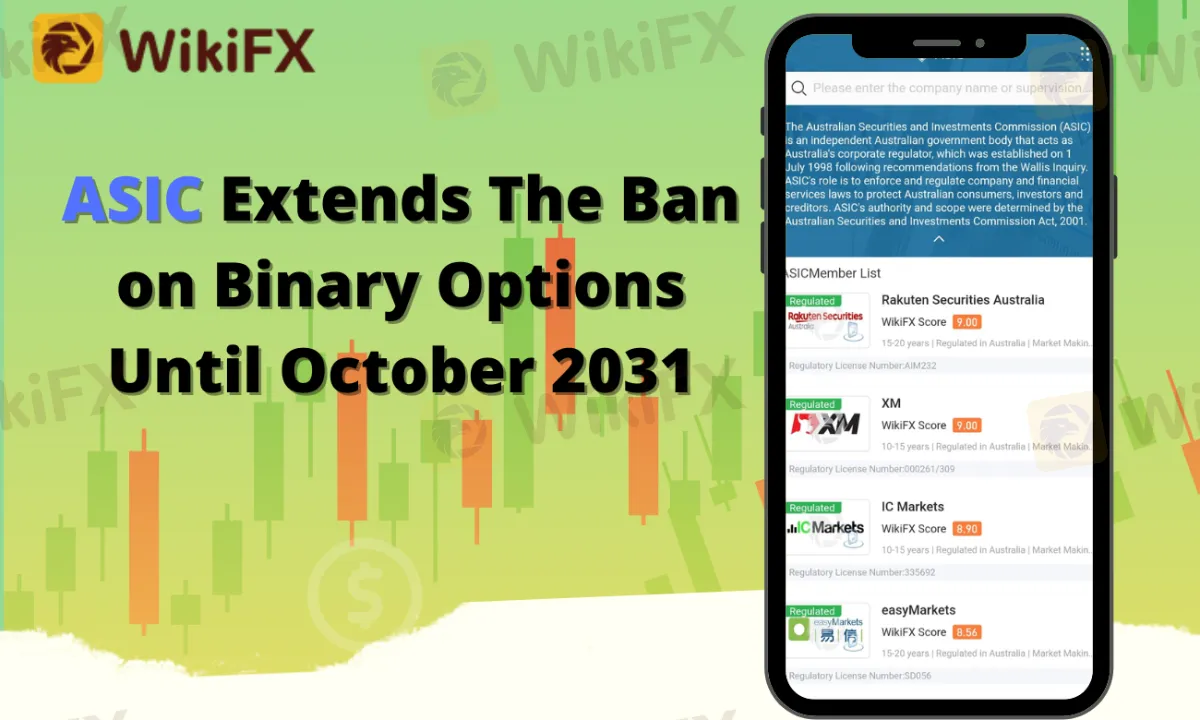简体中文
繁體中文
English
Pусский
日本語
ภาษาไทย
Tiếng Việt
Bahasa Indonesia
Español
हिन्दी
Filippiiniläinen
Français
Deutsch
Português
Türkçe
한국어
العربية
ASIC Extends The Ban on Binary Options Until October 2031
Abstract:According to ASIC, its first product intervention order prohibiting retail binary options occurred after regulatory assessments between 2017 and 2019 revealed that around 80% of traders were losing money.

The restriction will make it illegal for regulated brokers to provide binary options to regular traders.
It first went into effect on May 3, 2021.
On Monday, the Australian Securities and Investments Commission (ASIC) affirmed the extension of the prohibition on the issuing and distribution of binary options to Australian retail consumers until October 1, 2031.
The product intervention order was issued more than a month before the Australian Securities and Investments Commission's (ASIC) initial ruling for the ban, which went into force for 18 months on May 3, 2021.
Binary options are OTC products that enable investors to bet on the occurrence or non-occurrence of an event within a certain period. These gadgets are easy to learn yet very dangerous.
According to ASIC, its first product intervention order prohibiting retail binary options occurred after regulatory assessments between 2017 and 2019 revealed that around 80% of traders were losing money.
Global Position on Binary Options
Most other worldwide markets have outlawed binary options products. Binary options have also been prohibited in the United Kingdom, the European Union, Israel, and numerous other nations owing to the hazards and pervasive fraud associated with the instruments. Surprisingly, the retail distribution of binary options is permitted in the United States. The CME Group will also issue binary option-structured event contracts in the coming weeks.
Meanwhile, ASIC is preparing to tighten laws governing other retail OTC marketplaces. Furthermore, it severely limited the maximum leverage that CFD brokers may give to ordinary traders.
About ASIC
The Australian Securities and Investments Commission (ASIC) is a non-partisan Australian government agency that serves as the country's business regulator. It was formed on July 1, 1998, in response to the Wallis Inquiry's recommendations. The purpose of ASIC is to enforce and regulate corporate and financial services laws to safeguard Australian consumers, investors, and creditors. The Australian Securities and Investments Commission Act, 2001 established ASIC's jurisdiction and scope.

About WikiFX
Wikifx is a platform for searching worldwide company financial information. Its primary duty is to give the included foreign exchange trading organizations with basic information searching, regulatory license seeking, the credit assessment, platform identification, and other services.

Wikifx has created a big data solution that unifies data gathering, data screening, data aggregation, data modeling, and data productization using public data from government agencies, sophisticated sniffer systems, and scientific computer algorithms. Wikifx may then assess the supervision and risk levels of the associated organizations across several dimensions and give matching security solutions to individual users, corporate users, and government agencies.
Keep an eye out for additional regulatory news.
WikiFX App may be downloaded through the App Store or the Google Play Store.

Disclaimer:
The views in this article only represent the author's personal views, and do not constitute investment advice on this platform. This platform does not guarantee the accuracy, completeness and timeliness of the information in the article, and will not be liable for any loss caused by the use of or reliance on the information in the article.
Read more

The Hidden Checklist: Five Unconventional Steps to Vet Your Broker
Forex broker scams continue to evolve, employing new tactics to appear credible and mislead unsuspecting traders. Identifying these fraudulent schemes requires vigilance and strategies beyond the usual advice. Here are five effective methods to help traders assess the legitimacy of a forex broker and avoid potential pitfalls.

Doo Financial Obtains Licenses in BVI and Cayman Islands
Doo Financial, a subsidiary of Singapore-based Doo Group, has expanded its regulatory footprint by securing new offshore licenses from the British Virgin Islands Financial Services Commission (BVI FSC) and the Cayman Islands Monetary Authority (CIMA).

CFI’s New Initiative Aims to Promote Transparency in Trading
A new programme has been launched by CFI to address the growing need for transparency and awareness in online trading. Named “Trading Transparency+: Empowering Awareness and Clarity in Trading,” the initiative seeks to combat misinformation and equip individuals with resources to evaluate whether trading aligns with their financial goals and circumstances.

Malaysian-Thai Fraud Syndicate Dismantled, Millions in Losses Reported
The Royal Malaysia Police (PDRM) has received 26 reports concerning the Nicshare and CommonApps investment schemes, both linked to a major fraudulent syndicate led by a Malaysian citizen. The syndicate’s activities came to light following the arrest of its leader by Thai authorities on 16 December.
WikiFX Broker
Latest News
Top 10 Trading Indicators Every Forex Trader Should Know
ASIC Sues Binance Australia Derivatives for Misclassifying Retail Clients
WikiFX Review: Is FxPro Reliable?
Malaysian-Thai Fraud Syndicate Dismantled, Millions in Losses Reported
Trading frauds topped the list of scams in India- Report Reveals
YAMARKETS' Jingle Bells Christmas Offer!
AIMS Broker Review
The Hidden Checklist: Five Unconventional Steps to Vet Your Broker
WikiFX Review: Something You Need to Know About Markets4you
Revolut Leads UK Neobanks in the Digital Banking Revolution
Currency Calculator


